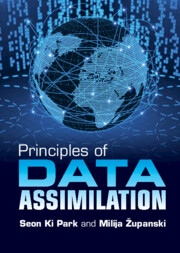

Lee, Woo-Jin Park, Rae-Seol Kwon, In-Hyuk Clayton, Adam Kim, Junghan and Choi, In-Jin 2023. Numerical Weather Prediction: East Asian Perspectives. p. 37.
Kang, Wei Xu, Liang and Zhou, Hong 2024. Observability and Effective Region of Partial Differential Equations with Application to Data Assimilation. SIAM Journal on Scientific Computing, Vol. 46, Issue. 3, p. C249.
Chen, Yumeng Smith, Polly Carrassi, Alberto Pasmans, Ivo Bertino, Laurent Bocquet, Marc Finn, Tobias Sebastian Rampal, Pierre and Dansereau, Véronique 2024. Multivariate state and parameter estimation with data assimilation applied to sea-ice models using a Maxwell elasto-brittle rheology. The Cryosphere, Vol. 18, Issue. 5, p. 2381.
Seon Ki Park , Ewha Womans University, Republic of Korea , Milija Zupanski , Colorado State University
Publisher: Cambridge University Press Online publication date: September 2022 Print publication year: 2022 Online ISBN: 9781108924238 Digital access for individuals (PDF download and/or read online) Added to cart Digital access for individuals (PDF download and/or read online)Data assimilation is theoretically founded on probability, statistics, control theory, information theory, linear algebra, and functional analysis. At the same time, data assimilation is a very practical subject, given its goal of estimating the posterior probability density function in realistic high-dimensional applications. This puts data assimilation at the intersection between the contrasting requirements of theory and practice. Based on over twenty years of teaching courses in data assimilation, Principles of Data Assimilation introduces a unique perspective that is firmly based on mathematical theories, but also acknowledges practical limitations of the theory. With the inclusion of numerous examples and practical case studies throughout, this new perspective will help students and researchers to competently interpret data assimilation results and to identify critical challenges of developing data assimilation algorithms. The benefit of information theory also introduces new pathways for further development, understanding, and improvement of data assimilation methods.
To save content items to your account, please confirm that you agree to abide by our usage policies. If this is the first time you use this feature, you will be asked to authorise Cambridge Core to connect with your account. Find out more about saving content to .
To save content items to your Kindle, first ensure coreplatform@cambridge.org is added to your Approved Personal Document E-mail List under your Personal Document Settings on the Manage Your Content and Devices page of your Amazon account. Then enter the ‘name’ part of your Kindle email address below. Find out more about saving to your Kindle. Note you can select to save to either the @free.kindle.com or @kindle.com variations. ‘@free.kindle.com’ emails are free but can only be saved to your device when it is connected to wi-fi. ‘@kindle.com’ emails can be delivered even when you are not connected to wi-fi, but note that service fees apply. Find out more about the Kindle Personal Document Service.